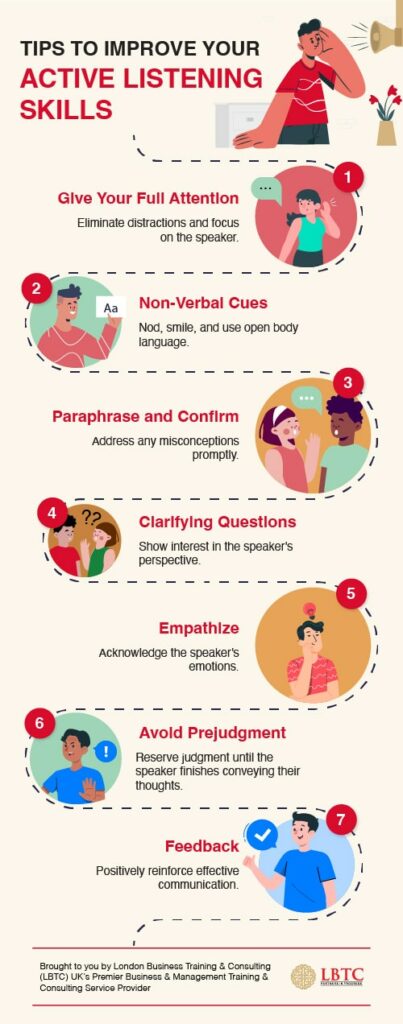
Since communication is the foundation of any relationship, mentors and mentees must recognize their communication preferences and ensure they are compatible with their mentoring partner. It’s a vital life skill that may be used in business, at home, or in any communication.
How can we develop our listening skills, especially how can we become active listeners?
How Does Active Listening Work?
Fundamentally, active listening is a communication strategy beyond simply hearing what the other person is saying. It entails paying attention to the speaker’s words, tone, facial expressions, and body language. Engaging in active listening is being aware of the feelings, emotions, and concerns the speaker expresses behind the words. Active listeners ensure they fully comprehend what the speaker is saying instead of only answering words.
Fortunately, practice will help you get better at this talent. It entails paying closer attention to the words and body language of others, responding in a way that demonstrates that you’re genuinely comprehending and listening, and asking questions to elicit further information about feelings and thoughts.
6 Qualities that Active Listeners have
1. They cease conversing
Though it might seem obvious, this can be more difficult than you imagine! When some people pause in conversation, it’s usually because they consider their following words. Not with attentive listeners, however! Active listeners genuinely listen to what you have to say before giving in to the temptation to think of their response.
2. They see listening as an educational process.
As stated in Part 7 of our series, the best mentors are lifelong learners. They should also be active listeners since active listening is characterized by viewing the listening process as a learning opportunity. These listeners frequently believe that the speaker—regardless of the speaker’s identity—can impart knowledge to them. They never stop learning new things.
3. They direct the conversation.
Active listeners lead conversations by avoiding simple “yes” or “no” answers. They use open-ended questions; like “What alternatives have you considered?” to guide mentees toward discovering solutions independently. This approach, described as ‘tactical empathy’ by Chris Voss, aims for a “that’s right” response, not just a “yes.” Active listeners build camaraderie and trust by understanding and summarizing someone’s thoughts, fostering a deeper connection with their counterparts. The goal is to genuinely learn about the other person through thoughtful, open-ended questions.
4. They provoke thought
Active listener-mentors don’t free their mentees of responsibility with pretentious answers; instead, they utilize guiding questions to help them get where they need to be. Instead, they make sure to extract useful information from each discussion. Asking questions such as “Tell me how you plan to accomplish X” or “How did you decide that Y was the best choice?” may help uncover these. These straightforward inquiries help concentrate the discussion and highlight crucial revelations and following measures. Top of Form
5. They consider more than simply your words.
These mentors observe not just what you say but also how you say it and the movements of your body during speech. This is because our accurate messages frequently manifest themselves via our body language rather than words; they may be less intellectual and more emotive. Mentors actively listening to you know to search for this to grasp your message fully.
6. They listen intently, summarize, and offer encouraging remarks.
Influential mentors pay attention to your thoughts and show respect, even when opinions differ. They ensure understanding by summarizing your points with statements like “If I’m understanding you correctly…” or “Tell me if this is what you’re saying.” Additionally, they use positive feedback, such as nods or smiles, signalling encouragement and interest. Active listening requires effort; these mentors actively engage by sitting up straight, taking notes, asking questions, and mirroring back information. If your mentor displays such behaviour, consider it a valuable investment in your growth and development. The practice of active listening can contribute to creating a more empathetic and supportive world.
Bottom line
Recognizing the significance of communication preferences and ensuring compatibility forms the foundation of successful mentor-mentee relationships. As you embark on your journey of learning and development, consider the profound impact of honing your active listening skills. Enrich your mentorship experiences by actively engaging with others, asking thoughtful questions, and fostering a culture of understanding. Whether you seek a communication skills course or a learning and development course, practising active listening will undoubtedly propel you towards becoming a more empathetic and supportive mentor or mentee.


Leave a Reply